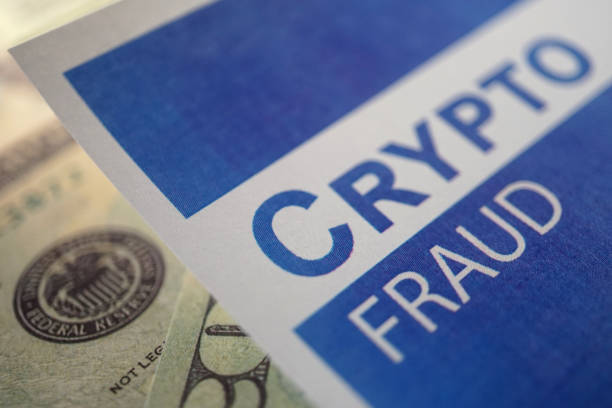Cryptocurrency scams and frauds have become increasingly common as more people invest in digital currencies. With the rising popularity of Bitcoin and other cryptocurrencies, it is important to be aware of the risks associated with investing in them. This blog post will provide helpful tips on how to avoid becoming a victim of cryptocurrency scams and fraud. We will discuss the different types of scams and frauds to watch out for, as well as strategies for staying safe while investing in cryptocurrencies.
1)What is a scam?

Cryptocurrency scams and frauds are any type of deceptive activity that seeks to take advantage of unsuspecting victims, usually by promising them a financial reward in exchange for their funds. They can range from phishing attempts to elaborate Ponzi schemes and may involve identity theft, unauthorized access to accounts, fake tokens, and more.
2)How do scammers operate?
Cryptocurrency scams and frauds are becoming increasingly prevalent in today’s digital world. Scammers use a variety of techniques to target unsuspecting victims, such as fake websites, emails, and social media messages. They often try to pressure victims into sending them money or personal information, such as credit card numbers or passwords.
3)What are the most common cryptocurrency scams?

Cryptocurrency scams and frauds are becoming increasingly prevalent as the cryptocurrency industry grows. The most common scams involve phishing, fake ICOs, Ponzi schemes, pump-and-dump schemes, and malicious wallet apps. Phishing involves sending fraudulent emails or messages in an attempt to get sensitive information such as passwords, usernames, or financial details. Fake ICOs involve setting up a scam project with the promise of making investors rich quickly.
4)How can you avoid being scammed?
The most important way to protect yourself from Cryptocurrency scams and frauds is to stay informed. Do your research before making any investment decisions, especially if someone is offering you a “guaranteed return” or any other type of “too good to be true” offer. Make sure you know exactly who you are dealing with and never share your private keys or passwords with anyone.
5)What should you do if you have been scammed?

If you believe you have been a victim of a cryptocurrency scam or fraud, the first step is to take action and report the incident. Gather as much information as you can about the scam, such as the name of the person or organization responsible, contact details, website address, transaction records, etc. and report it to the relevant authorities.
6)How can you report a scammer?
If you have been a victim of a cryptocurrency scam or fraud, you should report it immediately. Reporting a scammer can help prevent them from continuing to target other victims. You can report scammers to the authorities, such as your local police, the Federal Trade Commission (FTC), or the Internet Crime Complaint Center (IC3).
Additionally, you should alert your financial institution so they can take steps to protect your accounts. Finally, you should consider notifying any exchanges or services that you used during the transaction so they can be aware of potential scams and frauds. By reporting scammers, you can help protect yourself and others from falling victim to cryptocurrency scams and frauds.
7)What are the consequences for scammers?
Cryptocurrency scams and frauds are highly punishable offenses with serious legal ramifications. Depending on the nature of the scam and its severity, scammers may face criminal charges, civil penalties, and asset forfeiture. They could also be held liable for repaying the victims they defrauded and could face substantial fines, restitution orders, and even prison time.
It is important to remember that these scams and frauds have severe consequences and should be reported as soon as possible. Crypto scammers must be aware that the legal system takes cryptocurrency frauds and scams very seriously. This means that victims of cryptocurrency fraud are afforded the same protections as victims of other types of fraud or theft, with the full force of the law behind them.
Crypto scammers should also be aware that they may not only face criminal charges, but also civil lawsuits, hefty fines, and asset forfeiture. The consequences for cryptocurrency scammers are very real, so everyone needs to stay vigilant when it comes to crypto.
8)How can you protect yourself from becoming a victim of crypto crime?
The best way to protect yourself from Cryptocurrency scams and frauds is to be informed and stay vigilant. Research any potential investments before putting money into them, and be wary of offers that seem too good to be true. Make sure to read any contracts or agreements carefully before signing them, and never provide your personal or financial information to anyone you don’t know.
Be cautious when sending money and use secure payment methods whenever possible. Finally, always report suspicious activity as soon as you become aware of it, and never hesitate to reach out to law enforcement if you feel like you have been victimized by a scammer. As a general rule, it’s always a good idea to be cautious of any offer related to cryptocurrency.
Keep in mind that the majority of cryptocurrency scams and frauds involve someone pretending to be a legitimate business to steal your money. Never give out your personal information or money unless you are 100% sure that the person or business you are dealing with is legitimate. If you have any doubts, do not hesitate to get a second opinion from someone you trust.
9)What are some red flags to look out for?
It is important to be aware of the common signs of Cryptocurrency scams and frauds so that you can protect yourself from becoming a victim. These red flags include requests for personal information such as passwords or credit card numbers, unrealistic promises of high returns, unsolicited requests to invest, offers that sound too good to be true, and requests to pay in Bitcoin or other cryptocurrencies.
10)Resources for victims of crypto crime
If you have been the victim of cryptocurrency scams and fraud, there are many resources available to help. Some organizations specialize in providing support and advice to victims of crypto crime, such as the Crypto Crime Victims Alliance (CCVA). The CCVA is a nonprofit organization dedicated to educating the public on the dangers of crypto crime and helping victims recover their losses.
